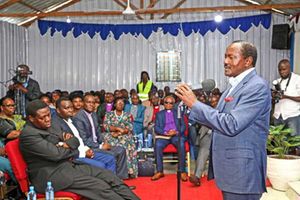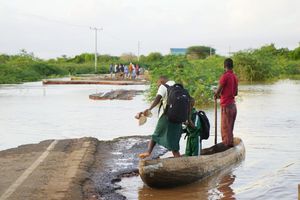Heads caution against hasty laptops roll-out

PHOTO | GIDEON MAUNDU Headteachers are shown institutional Jua Kali jikos on display by Ms Sophia Nyagah (left) at the Rural Technology Enterprises stand during the Kenya Secondary Schools Heads Association’s 38th Annual Delegates Conference at Wild Waters Resort, Mombasa on June 18, 2013.
What you need to know:
- Computers to pupils ‘should not be a priority over employing teachers to ease crowded classes’
- The government has allocated Sh53 billion for the laptops project, and overlooked the employment of teachers, a decision that has angered teachers’ unions
- By next year, if the project is implemented according to the report, 6,275 primary schools will benefit in the first phase. Another 7,046 primary schools will be covered in 2015 and an equal number in 2016 when the programme ends
Pupils should not be provided with laptop computers, secondary school headteachers have said.
Instead, the government should set up computer labs in the schools for use by all pupils, secondary schools headteachers association chairman John Awiti said on Wednesday.
But even with that, the provision of computers to pupils should not be made a priority over the employment of teachers to put an end to crowded classrooms, Mr Awiti said.
Speaking on the sidelines of the 38th annual conference of the Kenya Secondary Schools Heads Association at Wild Waters Centre, Mombasa, Mr Awiti noted that the implementation of President Uhuru Kenyatta’s pledge to children should not be hurried.
“The approach in implementation of this project should start with the teachers. Firstly, employ enough teachers in the schools and then train them to be in a position to train the learners how to go about using the computers.”
Mr Awiti, who is the principal at St Mary’s Yala in Kisumu, said the next stage should be a focus on the content to be loaded onto the machines for distribution in primary schools.
“We should not rush to have a foreign curriculum loaded onto the computers. The Kenya Institute of Curriculum Development (KICD) should be given enough time to prepare relevant local curriculum.”
KICD director Lydia Nzomo has said the agency is developing digital content that will be rolled out in the schools. A pilot project is currently underway.
But of equal concern was safety of the laptop computers.
Mr Awiti suggested that all schools establish labs at a central location where the pupils can use the machines because of the safety issues.
“If currently the pupils can’t keep their books and pens safe, how do you expect them not to lose or tamper with the laptops? Let this project be a well thought-out idea and not one rushed to implement.
“But whatever the case, let the government employ teachers first. Once there are enough teachers in schools, the pupils will learn,” he said.
The government has allocated Sh53 billion for the laptops project, and overlooked the employment of teachers, a decision that has angered teachers’ unions.
An initial report prepared by the Ministry of Education shows that the target is to reach 1.3 million children in Standard One starting next year with the laptop computers.
There are about nine million children currently enrolled in public primary schools across the country.
“After several consultations on how to implement the project, it has been recommended that a whole school focus be taken so that the 8.75 million children access the laptops instead of only 1.3 million Standard One pupils,” the report prepared last month shows. It notes that the laptops will be rolled out to schools in the first three years of the Jubilee government.
“Priority for selection of schools will be based on the e-readiness status of the school in terms of availability of electricity and classroom or secure storage room,” the report reads in part.
By next year, if the project is implemented according to the report, 6,275 primary schools will benefit in the first phase. Another 7,046 primary schools will be covered in 2015 and an equal number in 2016 when the programme ends. The report has also proposed labs instead of handing the children the laptops.
Kenya National Union of Teachers has already expressed opposition to the project, saying it is not a priority in the education sub-sector at the moment. Union chairman Wilson Sossion termed it as “highly suspect” project.




